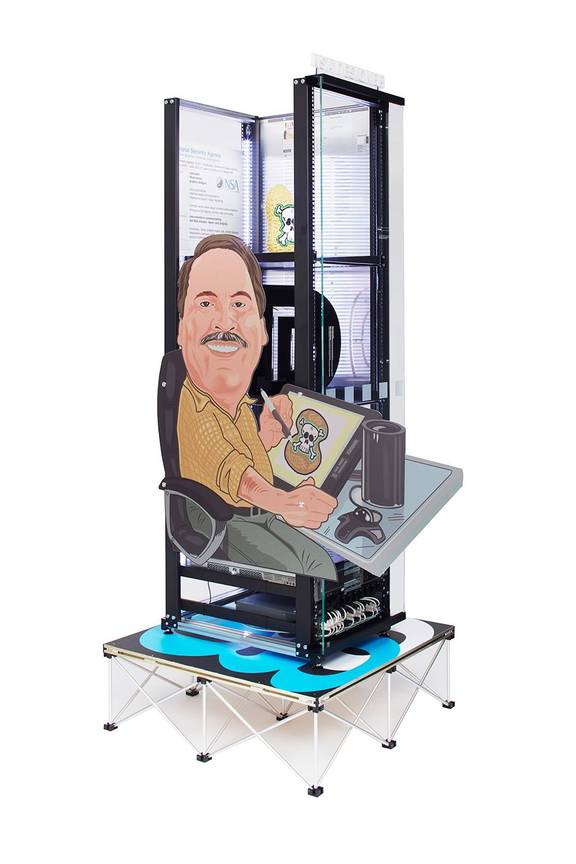Inspired by both hacker and management culture, the multilayered installations that Simon Denny is presenting at the exhibition "Business Insider" shed an ambivalent light on how the latest technological evolutions increasingly determine our lives.

Simon Denny frames the Zeitgeist in Wiels
Just like many of his contemporaries, Simon Denny (born in 1982 in Auckland) experienced the tangible reality of the digital revolution: when he moved from New Zealand to Berlin, his laptop suddenly became the most important product in his life. "It became an extension of myself; my window on the world," he tells us via Skype from that very same laptop. "That is precisely why I started reflecting on what technology is, who designs it, and of what it makes us capable and incapable. I started with the hardware. I made sculptures of the (technology) products in question. But I gradually started getting interested in who takes the decisions to make the products that are influencing andcontrolling our lives more and more."
Denny went to talk to the business leaders who develop new technology to ask about their motives. He shifted the focus on the artistic world, that he had learned at the art academy in Berlin, to techy culture. Before he realised, he had found a field of research that had rarely been explored by artists up to that point, "while the way in which these products and interfaces are designed and how easily and quickly we can now communicate with each other has an enormous impact on the way we think and act."
Denny says that he has always been a fan of artists who are firmly rooted in contemporary culture, from Andy Warhol to Nam June Paik. "They also interpreted and framed the time and the culture in which they lived, Warhol with his focus on celebrity and media culture, Paik by referring to how machines increasingly influence our environment and our brain."
ALLEGORY OF OUR KNOWLEDGE
At the "Business Insider" exhibition, Simon Denny is presenting two recent installations. The first was created last year for the New Zealand pavilion at the Venice Biennale and is based on the secret documents of the intelligence services that Edward Snowden leaked. "I was so fascinated by its graphic design that I started looking for the 'artistic author'," Denny says. "On the Internet, I found the profile of David Darchicourt, a freelance designer who spent years working for the NSA. His work was very similar to what the leaked documents looked like. That discovery – along with the space where the exhibition was to be held – was crucial to my installation. The Marciana library in Venice exhibits the oldest and most famous maps and globes, as an allegory of the value that we place on knowledge. My sculptures likewise valorise – albeit in a different time frame – information by visualising it, and that is precisely what Darchicourt did for the NSA." Denny had Darchicourt's designs redrawn or developed in 3D, printed Plexiglas and set model builders to work. "I upgraded bad quality JPEG images and introduced them to the physical world by exhibiting them in computer cases. I emptied computers or servers, which normally contain date, and I inserted glass fronts into them to turn them into display cases. The result 'monumentalises' the original online images."
The second installation Simon Denny is exhibiting at Wiels, an earlier commission for the Serpentine Gallery in London, shows how values, created in the context of hacking culture, have now been reinterpreted as a management strategy. "People often think that hackers are a particular type of person, while these days they are active in almost all sectors. My two installations concisely explore the power of an organisation culture, which in interactions with the latest technological evolutions increasingly controls our lives."
ENORMOUS GRAY ZONE
"You can conceive of my work as a critique but also as a celebration of a new and complex reality," Denny continues. "But I primarily aim to show the ambivalence of the world in which we live. You often simply don't know what to think of it, precisely because there are so many different forces at work. We don't know if the focus on security actually helps us to progress or not, or whether all these organisational cultures contribute something positive or negative. From the increased interest in my own work, I have noticed that themes like security and privacy have only become more important. But the Snowden case also taught us that even the cleverest techies struggle with big data."
"There is an enormous gray zone, in which you do not know who is telling the truth, let alone find out what the truth is. I think that is one of the reasons why populist politicians are so successful now. People want something basic to hold on to, and some politicians offer a cut-and-dry, black-and-white story, even though everything is obviously much more complex. I am convinced that even complexity can be managed, and can actually just be fun. But we will have to learn to adjust to it. Only when we are comfortable with complex facts, we can come to understand how the world really fits together."
SIMON DENNY: BUSINESS INSIDER
20/5 > 14/8, Wiels, www.wiels.org
Read more about: Expo
Fijn dat je wil reageren. Wie reageert, gaat akkoord met onze huisregels. Hoe reageren via Disqus? Een woordje uitleg.